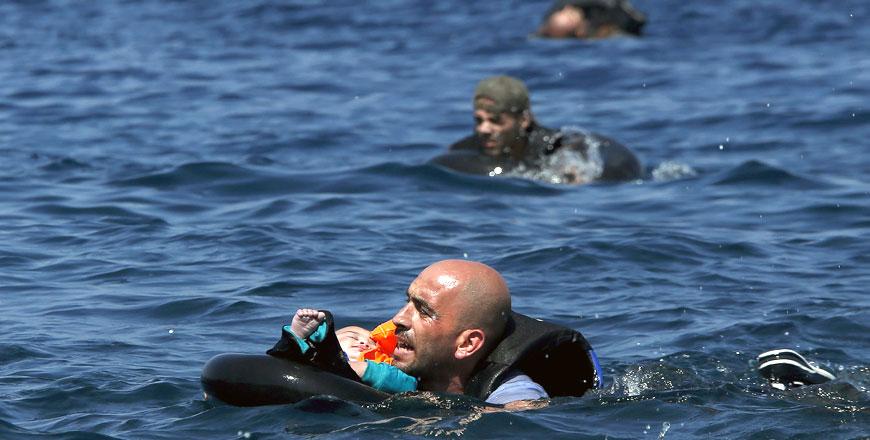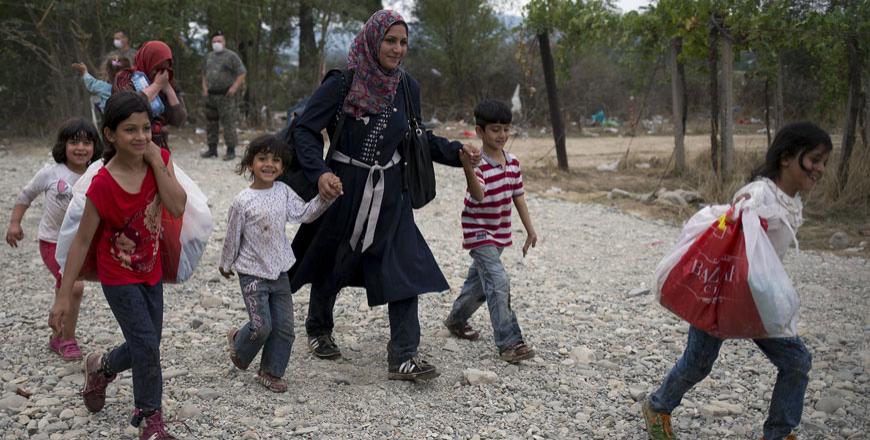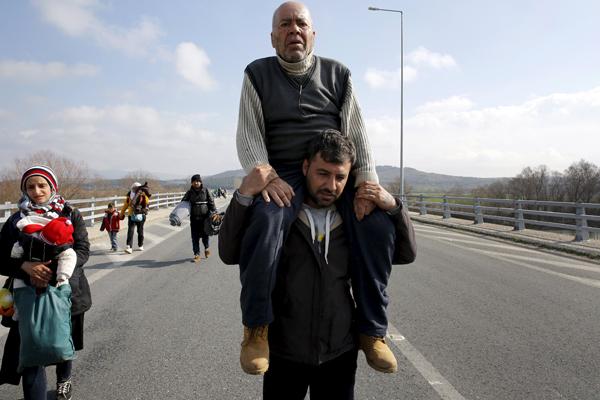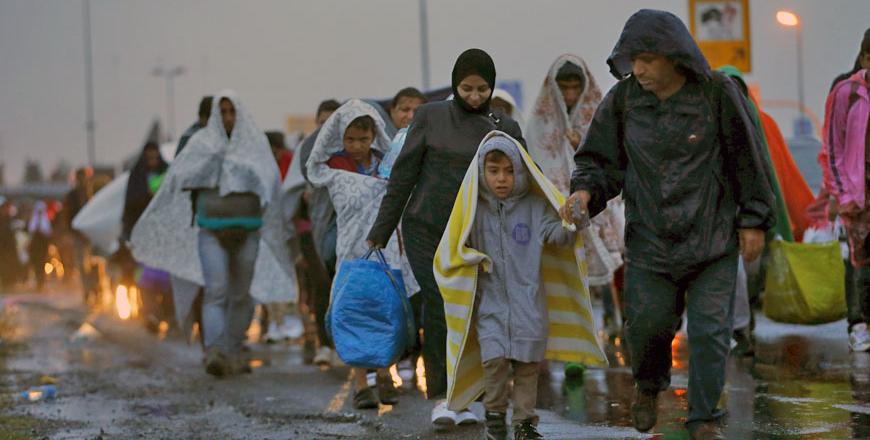You are here
Germany re-imposes border controls to slow migrant arrivals
By Reuters - Sep 13,2015 - Last updated at Sep 13,2015

A Syrian refugee holding a baby in a lifetube swims towards the shore after their dinghy deflated some 100 metres away before reaching the Greek island of Lesbos, on Sunday (Reuters photo)
BERLIN/BRUSSELS — Germany re-imposed border controls on Sunday after Europe's most powerful nation acknowledged it could scarcely cope with thousands of asylum seekers arriving every day.
Berlin announced that the temporary measure would be taken first on the southern frontier with Austria, where migrant arrivals have soared since Chancellor Angela Merkel effectively opened German borders to refugees a week ago.
"The aim of these measures is to limit the current inflows to Germany and to return to orderly procedures when people enter the country," said Interior Minister Thomas de Maiziere, adding that this was also necessary for security reasons.
Berlin took the step — which is allowed under Europe's Schengen treaty as long as it remains temporary — a day before EU interior ministers hold an emergency meeting to discuss spreading asylum seekers around the 28-nation bloc.
A European Commission proposal that each country should accept refugees under a system of compulsory quotas is meeting strong resistance from some countries, especially in central Europe. Slovakia said on Sunday it would try to block the plan.
Germany, Europe's largest and richest economy, has become a magnet for many people fleeing war and poverty in Syria and other parts of the Middle East, Asia and Africa. Police said around 13,000 migrants arrived in the southern city of Munich alone on Saturday, and another 3,000 on Sunday morning.
Now Germany has joined the list of smaller and poorer countries such as Greece and Hungary that are struggling to manage the huge flow of desperate people.
"This step became necessary. The great willingness to help that Germany has shown in recent weeks — by full-time employees and especially by the many thousands of volunteers — must not be overstrained," de Maiziere said.
The European Commission said Germany appeared legally justified in reimposing border controls, which have been removed in recent decades across much of the continent, and urged action at Monday's meeting in Brussels.
"The German decision of today underlines the urgency to agree on the measures proposed by the European Commission in order to manage the refugee crisis," it said in a statement.
Germany has halted train traffic from Austria, a spokeswoman for Austrian rail company OeBB said on Sunday. She said the head of the German rail company told his Austrian counterpart of the decision.
Amid political bickering among European governments, the crisis claimed yet more lives — 28 migrants drowned off a Greek island on Sunday when their boat sank, the coastguard said.
Limit of ability
Earlier, Berlin made clear it needed help from EU partners. "It's true: the European lack of action in the refugee crisis is now pushing even Germany to the limit of its ability," Economy Minister Sigmar Gabriel, who is also vice-chancellor, told the website of Der Tagesspiegel newspaper.
With large numbers of migrants stuck in squalid and chaotic conditions on European borders, or trudging along the side of motorways, Merkel last weekend stopped enforcing the EU's "Dublin" rules under which asylum seekers should register in the first member state they arrive in.
De Maiziere defended her decision but insisted the Dublin rules were still valid. "We need to quickly return to orderly procedures now," he added. "We can't allow refugees to freely choose where they want to stay — that's not the case anywhere in the world."
Most asylum seekers are refusing to stay in the poorer southern European countries where they arrive, such as Greece, and are instead making their way to Germany or Sweden where they anticipate a warmer welcome.
Germans have greeted them with cheers and volunteers are flooding in to assist at the end of their arduous and dangerous journeys by sea and land, often via Turkey and the Greek islands, and then onwards through the Balkans, Hungary and Austria.
Despite Germany's decision, Austria would not introduce additional checks at its border with Hungary, Chancellor Werner Faymann said, according to the Austrian news agency APA.
Red cross praise
Peter Maurer, president of the Geneva-based International Committee of the Red Cross, praised Merkel for showing leadership in the crisis.
But speaking to the Swiss newspaper SonntagsZeitung, Maurer expressed his disquiet after Hungarian Prime Minister Viktor Orban declared he would use a newly-built fence to close the border with Serbia to migrants on September 15, and that "rebellious" migrants would be arrested.
"I find it dangerous when a European country drifts in this direction," he said.
In Vienna, Faymann has likened Orban's treatment of refugees to the Nazis' deportation of Jews and others to concentration camps. Budapest responded by accusing him of conducting "a campaign of lies" against Hungary.
This tit-for-tat illustrated the rift within Europe.
Interior ministers from the EU's 28 member states will Commission proposals to redistribute about 160,000 asylum seekers across the bloc. Central European countries, however, reject the idea of compulsory quotas.
"It is impossible to retreat," Czech Prime Minister Bohuslav Sobotka said on Sunday. "We are helping, we are ready to help, but on a voluntary basis. The quotas won't work."
In neighbouring Slovakia, Interior Minister Robert Kalinak said he had a mandate from the government and parliament to try to block quotas. "They don't make any sense... and don't solve the crisis in any way," he said in a TV interview.
Island tragedy
Meanwhile, the migrants continued to risk all on the journey north. The Greek coastguard said the 28 drowned off the island of Farmakonisi in what was thought to be the largest recorded death toll from any single accident in Greek waters since the crisis began.
In the space of 90 minutes, a Reuters photographer saw 10 dinghies packed with refugees arriving from Turkey on the Greek island of Lesbos, just as caretaker Prime Minister Vasiliki Thanou was calling for a comprehensive EU policy to deal with the crisis.
Further up the refugee route, 8,500 migrants entered the former Yugoslav Republic of Macedonia from Greece between Saturday evening and Sunday afternoon, the United Nations refugee agency said.
Related Articles
MUNICH/BUDAPEST — Thousands of refugees and migrants streamed into Germany on Sunday, many travelling through Austria from Hungary where the
ATHENS — More than 5,000 people were stranded at the Idomeni camp on Greece's northern border with the Former Yugoslav Republic of Macedonia
HEGYESHALOM, Hungary/VIENNA — Austria and Germany threw open their borders to thousands of exhausted migrants on Saturday, bussed to the Hun



















